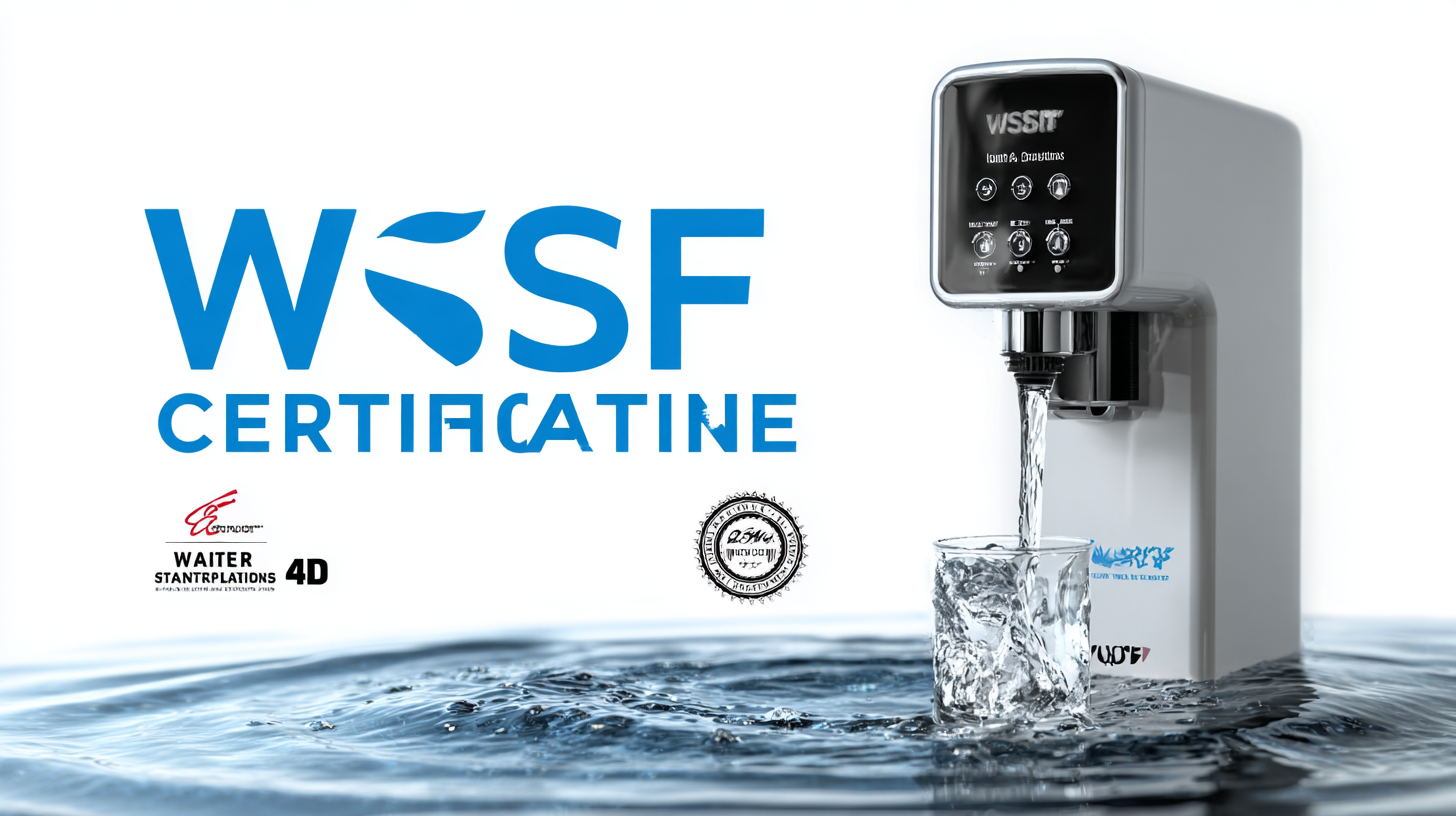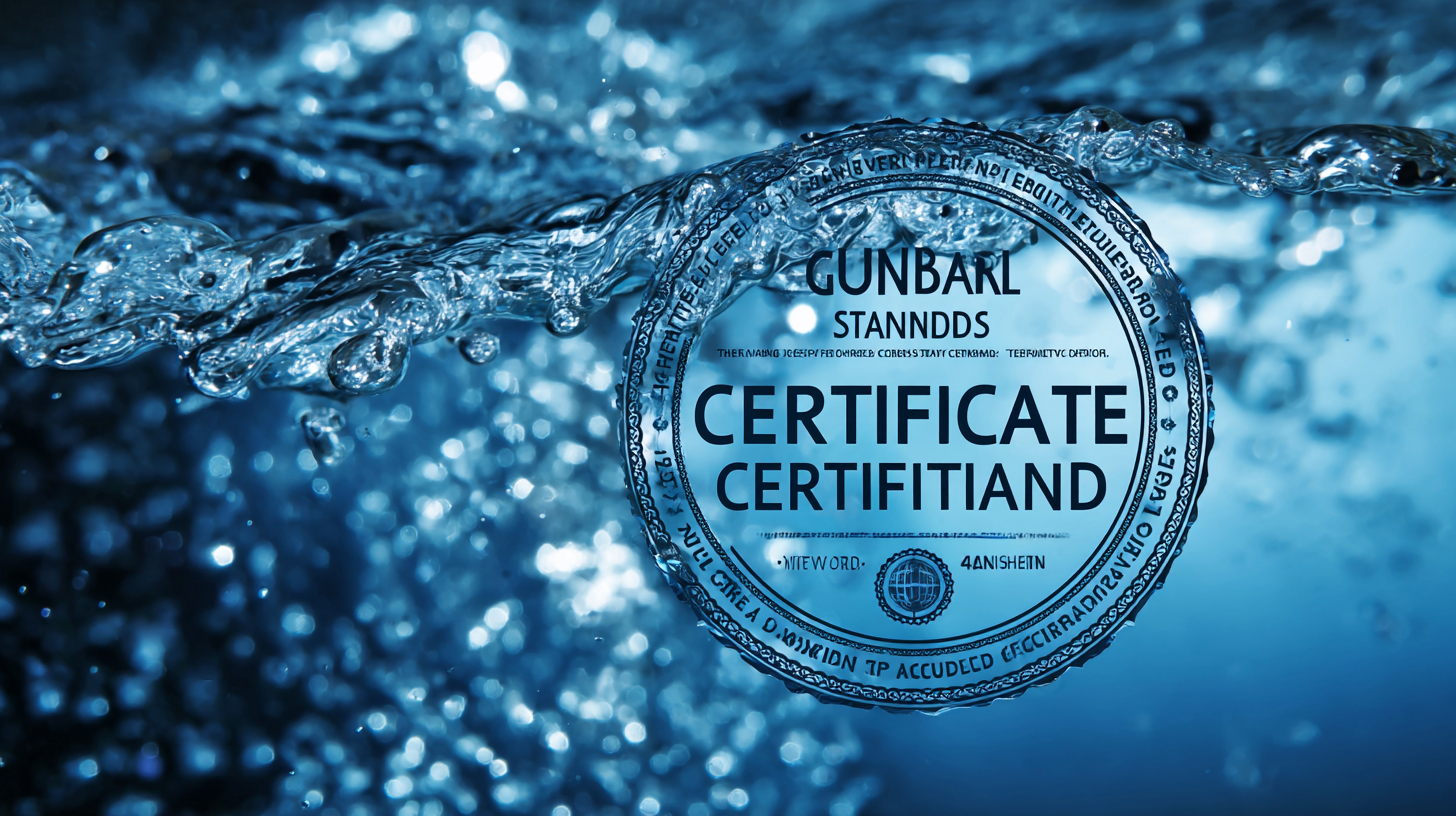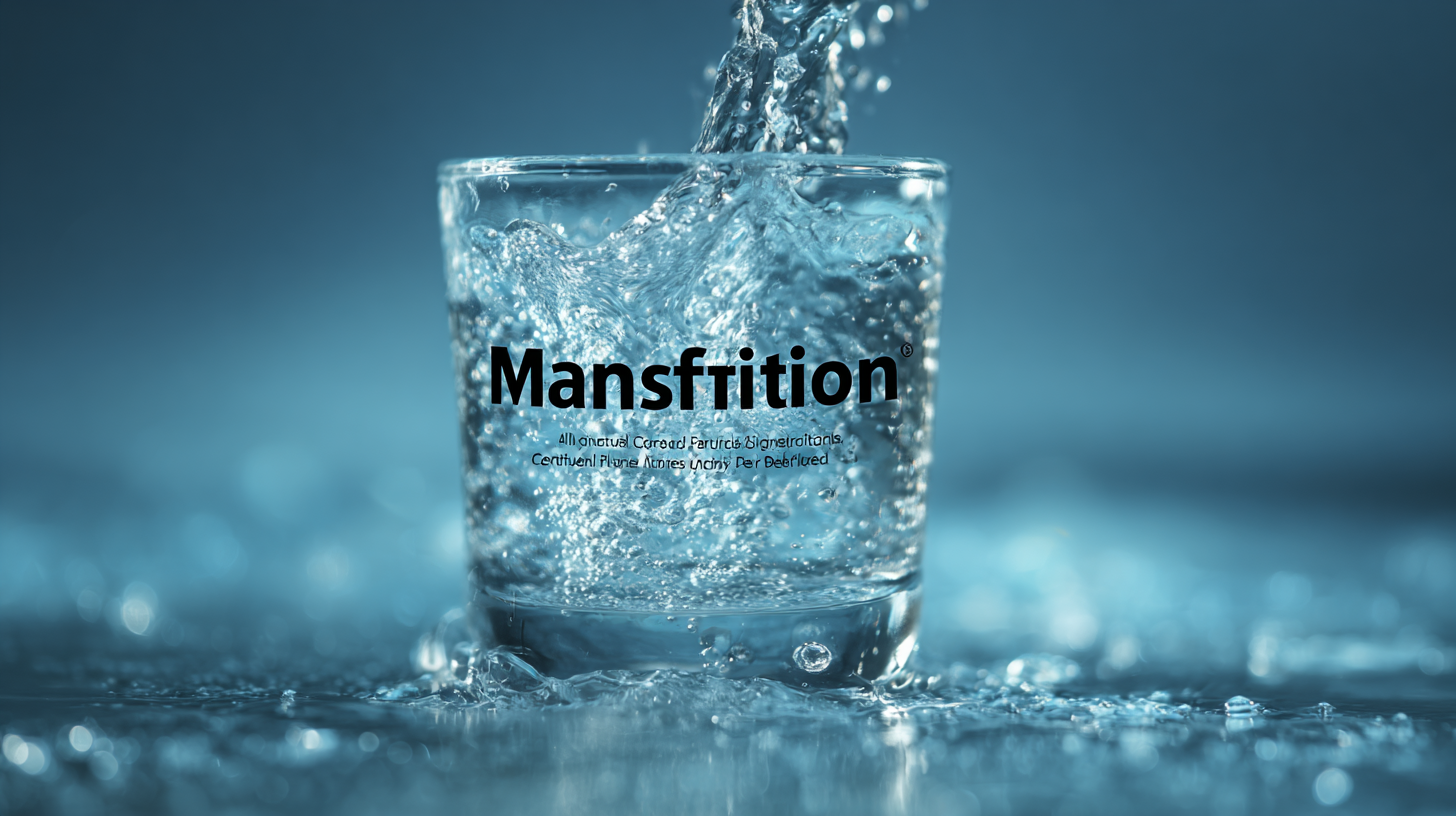
Unlocking Global Standards 7 Essential Certifications for the Best Water Purifier Industry
In an era where clean and safe drinking water is paramount, the water purifier industry plays a crucial role in safeguarding public health. According to a recent report by the World Health Organization, approximately 2 billion people worldwide lack access to safely managed drinking water, highlighting the urgent need for effective solutions. As consumers become more discerning, the demand for water purifiers equipped with essential certifications has significantly increased. Certifying bodies such as NSF International and the Water Quality Association have established standards ensuring that water purifiers meet rigorous quality and safety benchmarks. This blog will explore seven essential certifications that not only elevate the credibility of water purifiers but also empower consumers to make informed choices. By unlocking these global standards, stakeholders in the water purifier industry can enhance product quality, build consumer trust, and ultimately contribute to a healthier and safer global community.

Global Market Trends in the Water Purifier Industry: An Overview
 The water purifier industry is on an impressive growth trajectory, particularly in emerging markets like Vietnam. As the demand for clean and safe drinking water escalates, the market is projected to expand significantly, with estimates indicating an increase from $523.2 million in 2024 to $1.1792 billion by 2032. This growth reflects a compounded annual growth rate of 10.7%, driven by rising health awareness among consumers and government initiatives aimed at ensuring safe water access.
The water purifier industry is on an impressive growth trajectory, particularly in emerging markets like Vietnam. As the demand for clean and safe drinking water escalates, the market is projected to expand significantly, with estimates indicating an increase from $523.2 million in 2024 to $1.1792 billion by 2032. This growth reflects a compounded annual growth rate of 10.7%, driven by rising health awareness among consumers and government initiatives aimed at ensuring safe water access.
Moreover, the broader landscape of water and wastewater treatment technologies is evolving rapidly. Market research highlights key technological advancements including membrane filtration (such as reverse osmosis and ultrafiltration), activated carbon adsorption, and advanced oxidation processes. These innovations are vital in addressing municipal and industrial wastewater challenges, showcasing the dynamic interplay between technology and market demand. Events like the upcoming international water treatment exhibition in Amsterdam further underscore the industry's commitment to innovation and quality, attracting stakeholders eager to witness and share advancements in water purification.
Key Certifications That Elevate Water Purifier Standards Internationally
In the increasingly competitive water purifier industry, certifications play a crucial role in ensuring product quality and safety. These essential certifications not only help manufacturers meet regulatory standards but also elevate the credibility of their products in the global market. For consumers, understanding these certifications is vital when making informed purchasing decisions.
Among the key certifications that significantly influence international standards are NSF/ANSI, WQA Gold Seal, and ISO 9001. NSF/ANSI certification indicates that the water filter has been rigorously tested for safety and efficacy, providing peace of mind for consumers. The WQA Gold Seal, on the other hand, represents rigorous testing by the Water Quality Association, reflecting a high standard of industry practice. Furthermore, ISO 9001 certification assures customers of consistent quality management practices within the manufacturing process, ultimately reflecting a commitment to excellence in the water purification sector.
As the demand for safe and clean drinking water grows worldwide, the importance of these key certifications cannot be overstated. They not only reassure consumers regarding the safety and efficacy of their water purifiers but also allow manufacturers to stand out in a crowded market, fostering trust and recognition on an international scale.
Unlocking Global Standards: 7 Essential Certifications for the Best Water Purifier Industry
| Certification | Issuing Organization | Region | Key Focus | Validity Period |
|---|---|---|---|---|
| NSF/ANSI 55 | NSF International | Global | UV Treatment Systems | 3 Years |
| ISO 9001 | International Organization for Standardization | Global | Quality Management Systems | 3 Years |
| WQA Gold Seal | Water Quality Association | USA | Water Treatment Products | 3 Years |
| CE Marking | European Union | EU | Product Safety | Varies |
| NSF/ANSI 42 | NSF International | Global | Chlorine Reduction | 3 Years |
| EPA Registration | Environmental Protection Agency | USA | Pesticides and Antimicrobial Products | Renewable |
| ISO 14001 | International Organization for Standardization | Global | Environmental Management Systems | 3 Years |
The Role of Quality Control in Gaining Global Market Trust
Quality control plays a pivotal role in establishing trust in the global water purifier market. As countries like India advance their technological capabilities, achieving certifications like the IPC 001/610 QML exemplifies the commitment to superior quality standards. These certifications not only enhance product credibility but also facilitate market expansion in a competitive landscape. Companies that prioritize stringent quality control measures are better positioned to gain customer confidence and build lasting relationships in international markets.
In an era where technological competition is fierce, adhering to global standards is essential for companies seeking growth. The recent advancements in various industries underline the need for robust quality management systems. By focusing on quality control, businesses can not only comply with international standards but also respond effectively to market demands, enhance customer satisfaction, and ultimately drive profitability. This strategic emphasis on quality is what distinguishes leading players in the water purifier industry, allowing them to thrive and sustain their competitive edge globally.
Innovative Technologies Driving Water Purifier Certifications Forward
The water purifier industry has witnessed a remarkable evolution, propelled by innovative technologies that are reshaping certification standards. As consumers increasingly prioritize water quality and safety, manufacturers are responding by incorporating cutting-edge technologies into their purification systems. These advancements not only enhance the effectiveness of water treatment processes but also ensure compliance with stringent global standards.
One of the most significant developments is the integration of advanced filtration methods, such as reverse osmosis and UV-C sterilization. These technologies offer superior purification capabilities, often achieving higher removal rates of contaminants than traditional methods. Moreover, automation and smart monitoring systems are revolutionizing how consumers interact with their water purifiers, allowing for real-time quality assessments and maintenance alerts. As these innovations gain traction, certification bodies are updating their criteria to encompass these emerging technologies, ensuring that products meet the highest safety and performance benchmarks.
In addition to technological advancements, sustainability has become a focal point in water purifier certifications. Many companies are now incorporating eco-friendly materials and energy-efficient designs into their products. This shift not only addresses consumer demand for environmentally responsible solutions but also aligns with modern regulatory frameworks. As the industry embraces these innovative technologies, the pathway to unlocking global standards becomes clearer, paving the way for safer and more reliable water purification options for consumers worldwide.
Unlocking Global Standards: Water Purifier Certifications
This chart represents the number of certifications for various innovative technologies in the water purifier industry. It highlights the essential certifications required to ensure the quality and safety of water purification systems globally.
Case Studies: Successful Global Brands in the Water Purifier Sector
The water purifier industry has seen numerous brands emerging as global leaders, each demonstrating how adherence to essential certifications can elevate their market presence. One notable example is Brita, which has successfully leveraged its NSF certification to assure consumers of its product safety and quality. Known for its innovative filtration technology, Brita’s commitment to meeting global standards has positioned it as a trusted choice among environmentally conscious consumers.

Another case study is that of Aquasana, which boasts certifications such as the Water Quality Association's Gold Seal. This recognition highlights their effectiveness in removing contaminants, setting a benchmark for competitors. By focusing on sustainability and using eco-friendly materials, Aquasana appeals to a growing demographic that prioritizes both health and environmental impact. Their strategic use of certifications not only enhances their credibility but also reinforces their message of enhancing water quality while being kind to the planet.
